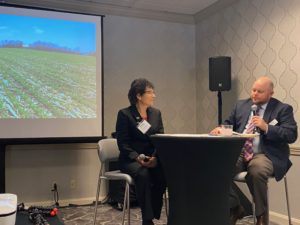Northern Commodity Transportation Conference to cover all the ag transportation bases
If you build it, they will come.
In a matter of months, the inaugural Northern Commodity Transportation Conference (NCTC) has transformed from a brainstorm to a fully-curated meeting with dozens of panelists, ensuring coverage of every link in the ag transportation chain.
After all, every player in commodity transportation can empathize with the complex system of moving commodities from the Tri-State region to the West Coast for export. To untangle today’s myriad of transportation roadblocks, Ag Management Solutions, in conjunction with commodity groups from Minnesota, North Dakota and South Dakota, is set to unveil the NCTC March 11-12 in Bloomington, Minn.
“We are extremely encouraged by the response the NCTC has received,” says AMS CEO Tom Slunecka, who reported more than 100 farmers, industry leaders and legislative assistants will be in attendance. “The enthusiasm surrounding this event proves that there’s a demand to discuss these important, relevant topics in commodity transportation.”
This unique, first-of-its-kind conference will unite the entire commodity transportation industry to share and learn about trade barriers, struggles, similarities and opportunities along the transportation route as commodities leave combines in Minnesota, South Dakota and North Dakota and head for international waters.
“At the end of the day, we are all in this together,” Slunecka says. “If the system cannot turn a profit, neither can our farmers. Without profitable farmers, there will be no grain to feed the system.”
Transportation and non-tariff barrier topics such as grain quality criteria, phytosanitary issues, rail reliability and regulations and trucking efficiencies will be discussed. The majority of the topics will begin with a panel format, allowing for free-flowing, robust dialogue among all attendees.
“As privately funded transportation systems, railroads have unique challenges as we seek to continually improve service to our agricultural customers and ship their goods to markets,” says Steve Milligan, BNSF Railway’s ombudsman for agricultural products. “The NCTC is a great way to share information across the industry, and we look forward to being a part of it.”
Dozens of state officials and experts from the agriculture industry are slated to appear as featured speakers, including longtime economic and marketing consultant John Baize; American Soybean Association President Bill Gordon; Minnesota and North Dakota’s respective agriculture commissioners Thom Petersen and Doug Goehring; and National Grain and Feed Association President Randy Gordon. Staffers from Sen. Mike Rounds (S.D.), Sen. John Thune (S.D.), Sen. Amy Klobuchar, Sen. Tina Smith (Minn.), Sen. Amy Klobuchar and Rep. Angie Craig, respectively, will be in attendance. Local and regional media are also expected to cover the event.
“Our hope is to create a better understanding of the many issues and barriers we face from the combine until the grains reach international waters,” Slunecka says. “Each of these issues we’ll be discussing help drive profitability for the entire system.”
Team members in the grain, trading, sales, regulatory and management industries will glean substantial value from this conference. Potential NCTC attendees include: grain elevator and terminal loading managers, transcontinental shipping lines, shippers, transloading facilities, rail lines, commodity association leadership, state government, regulatory groups and more.
“With a full slate of speakers and panelists encompassing the breadth of the commodity transportation industry, the NCTC is an exciting new event for anyone who is a link in the ag transportation chain,” says North Dakota farmer Mike Langseth, chair of Northern Soy Marketing. “We’re proud to sponsor NCTC, and we encourage elevator employees and farmers to join us in the conversation and find solutions to the issues facing our industry.”
Registration is $200 per person; walk-ins are also welcome. Visit www.graintransportation.com to learn more and register.




